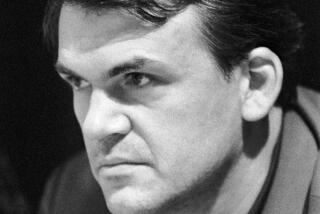A tangled web
- Share via
The Australian novelist Elliot Perlman has filched the title for his novel from William Empson’s precocious 1930 study of literary criticism. Empson, who published his “Seven Types of Ambiguity” shortly after he was expelled from Cambridge for possessing condoms, showed how ambiguity in poetry could express things that straightforward prose could not. Perlman’s big, baggy novel is about ambiguity more broadly speaking. As explained by Alex Klima, the novel’s resident psychiatrist, “A relationship between two people, just like a sequence of words, is open to different interpretations. And if two people do have differing views about their relationship
There are, as you might guess, seven lives at stake in “Seven Types of Ambiguity,” each outfitted with its own narrative. Set in contemporary Australia, the story revolves around Simon Heywood, an unemployed, self-pitying schoolteacher who can’t get over Anna, his university girlfriend from 10 years past. The obsession is so debilitating that Simon’s father has hired a psychiatrist, Alex. Eerily breaching the doctor-patient relationship, Alex relays his findings to a mysterious “you” -- who turns out to be Anna.
The plot kicks into high gear when Simon kidnaps Anna’s son and later goes to prison. In their own sections, the other characters try to make sense of the “Rashomon”-style action to the point that Simon’s real motivations seem hopelessly blurred. For Joe, Anna’s stockbroker husband, the kidnapping is Simon’s bid for sexual dominance over Anna; for Angelique, Simon’s live-in hooker with a heart of gold, he’s finally lost his mind. But Perlman’s real archvillain is the one no one can see -- the invisible hand of Thatcherite economics. Government downsizing is what forces Simon out of his job and what makes the MS-diagnosed Angelique sell herself to the highest bidder. Joe wagers everything on a deal with the richest man in Melbourne to Americanize -- that is to say demonize -- Australian healthcare. When Alex scares off investors with a newspaper editorial, he topples Joe’s world.
Perlman has made his career sharpening his nails on the free market. His previous book, “Three Dollars,” was a bitter Dreiserian tale of financial woe. One of the best-realized sections of his new novel comes when Joe gets stranded at a corporate retreat, unable to reach his precious investors. (The rules of the camp dictate that he must relinquish his cellphone.) It’s clear that he -- no less than Simon -- is in an inescapable prison. Perlman is especially deft at describing this kind of panicked mania, and perhaps that’s because his book suffers from some of it too. “Seven Types” is so jampacked with contemporary themes -- prostitution, corporate fraud, Jacques Derrida, pederasty, to name just a few -- that it reads as if it were written by someone all too assiduously following the recipe for the grand social novel.
Perlman has been dubbed Australia’s version of Jonathan Franzen or Philip Roth; he has even been compared to George Eliot. These he is surely not. For one, he fails to evoke the country that sets him apart -- his Melbourne is indistinguishable from San Diego. This is admittedly part of his point. But his book’s gravest failing is that its architecture ultimately overwhelms its characters. If there is anything Roth-like about Perlman, it’s that he agrees that “getting people wrong” is what most of life’s about. In this novel, it’s up to the reader to try to get them right. *
More to Read
Sign up for our Book Club newsletter
Get the latest news, events and more from the Los Angeles Times Book Club, and help us get L.A. reading and talking.
You may occasionally receive promotional content from the Los Angeles Times.









